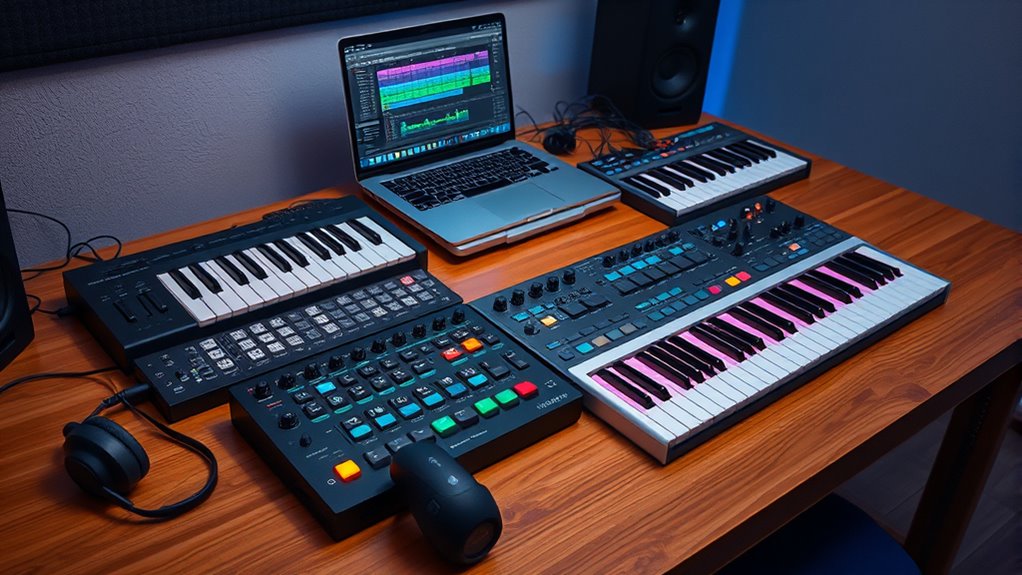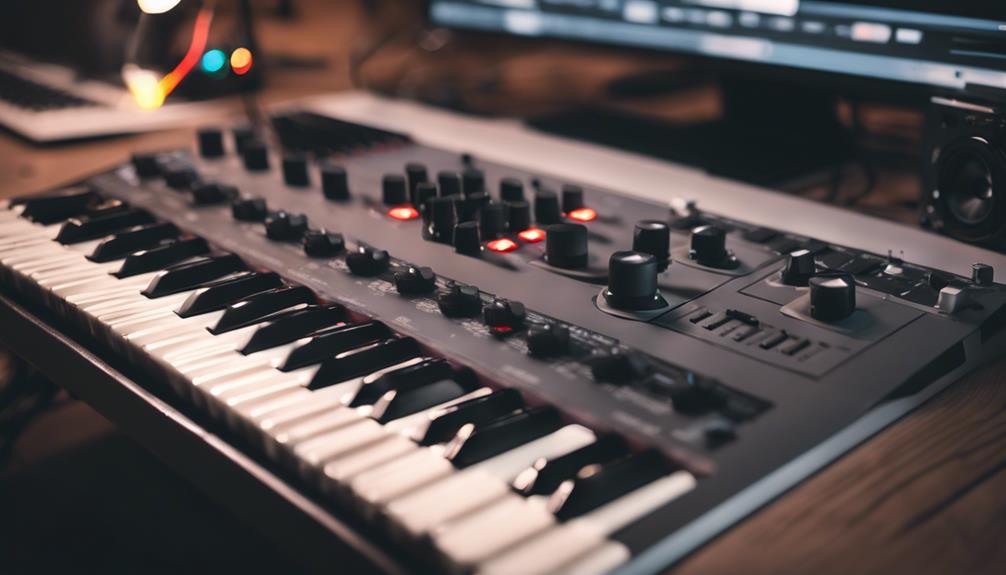If you’re after the 15 best wireless MIDI keyboards for smooth music production in 2025, I’ve got you covered. From compact, portable options like the Xkey 25 Air Bluetooth to versatile controllers like the Gemini Sound PianoProdigy, there’s something for every need. I’ve gathered options with solid connectivity, responsive keys, and handy features, so you can stay flexible whether you’re in the studio or on the move. Stick around to discover which models suit your musical journey best.
Key Takeaways
- Prioritize models with Bluetooth 5.0 and low latency for smooth wireless performance in music production.
- Focus on portability, lightweight design, and compact sizes ideal for mobile studios and live use.
- Look for controllers with versatile controls like velocity keys, pads, knobs, and customizable features.
- Ensure compatibility with major DAWs on Mac, Windows, iOS, and seamless device switching options.
- Consider durability and user reviews to select reliable wireless MIDI keyboards suitable for professional and casual use.
Xkey 25 Air Bluetooth MIDI Keyboard (Apple-Style, 25 Keys)
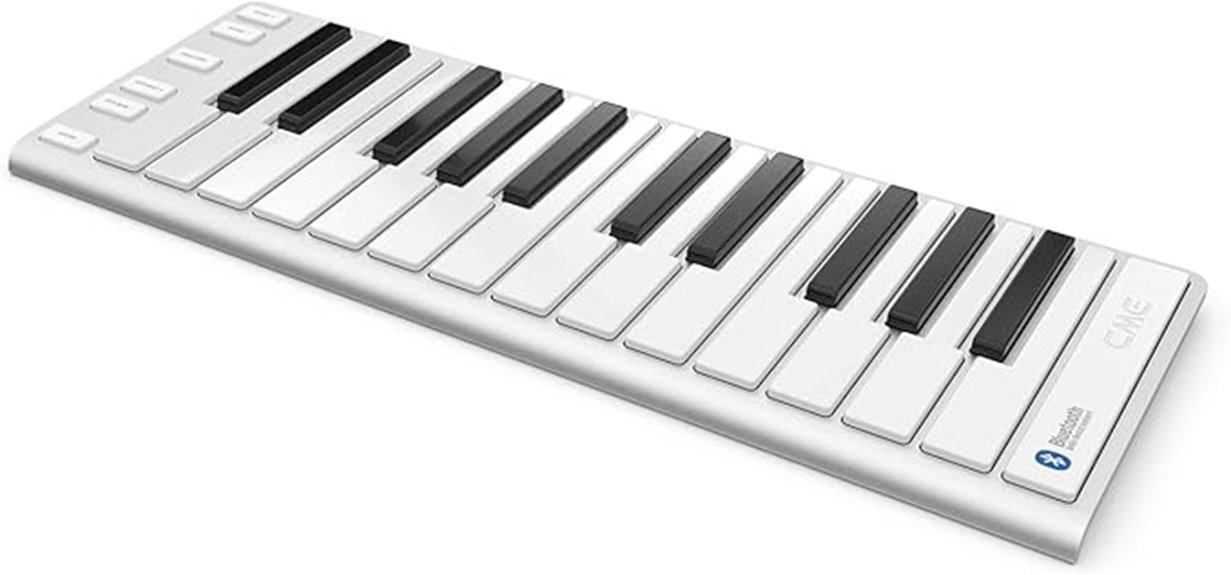
If you’re looking for a portable, high-quality MIDI keyboard that seamlessly connects via Bluetooth, the Xkey 25 Air is an excellent choice. Its ultra-thin aluminum frame resembles a MacBook Air, giving it a sleek, minimalist look. Weighing just 1.3 pounds, it’s perfect for mobile musicians. The keyboard features 25 velocity-sensitive keys with polyphonic aftertouch, offering expressive control. With Bluetooth low-latency wireless connectivity and USB support, it works smoothly with Windows, macOS, iOS, Linux, and Android. The free Xkey Plus app makes mapping easy, making this device ideal for on-the-go music creation with a professional feel.
Best For: mobile musicians and portable music producers seeking a sleek, Bluetooth-enabled MIDI keyboard with expressive control.
Pros:
- Ultra-thin, lightweight design resembling a MacBook Air for portability and style
- Full-size velocity-sensitive keys with polyphonic aftertouch for nuanced performance
- Seamless Bluetooth low-latency connection compatible with multiple operating systems
Cons:
- Durability concerns with proprietary cables and potential warranty issues
- Limited to 25 keys, which may restrict more complex performances
- Its length and cable requirements make it less ideal for true on-the-go use compared to simpler, smaller devices
Gemini Sound PianoProdigy 24-Key Bluetooth MIDI Keyboard
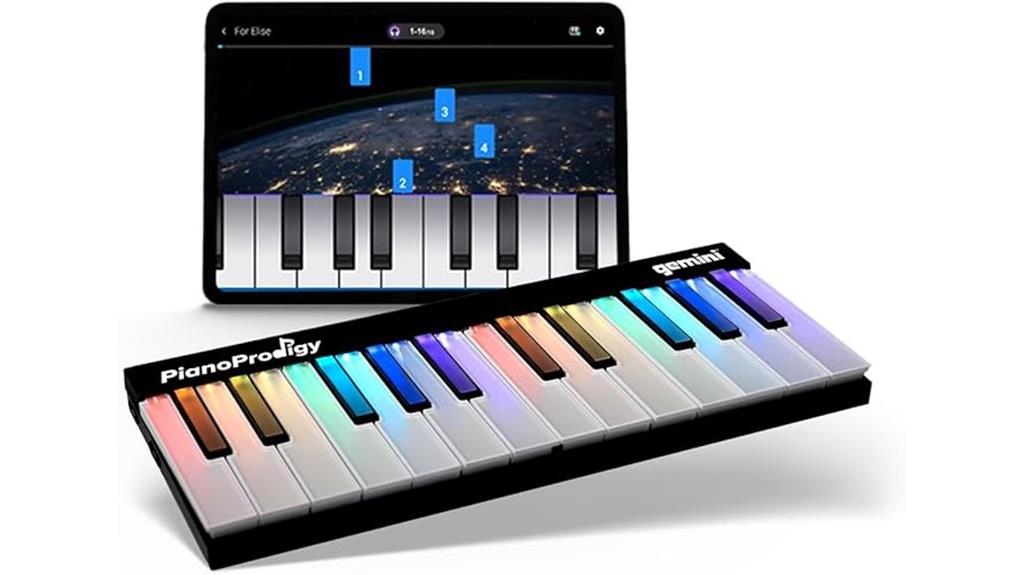
The Gemini Sound PianoProdigy 24-Key Bluetooth MIDI Keyboard is an excellent choice for beginners and young learners who need a portable, affordable way to explore music. Its light-up keys and Bluetooth connectivity make learning fun and accessible, especially for kids. Weighing just a pound, it’s highly portable and expandable to 48 or 72 keys with optional add-ons. However, it requires an external device for sound and lacks velocity sensitivity, octave controls, or MIDI IN ports. Connectivity can be tricky—some users report pairing issues and disconnections. Still, its simple design and educational features make it a solid entry-level tool, though it’s not suited for professional use.
Best For: beginners and young learners seeking an affordable, portable MIDI keyboard with educational features to explore music.
Pros:
- Lightweight and highly portable at just 1 pound, ideal for travel and on-the-go use
- Light-up keys and educational app features that facilitate beginner learning and engagement
- Expandable to 48 or 72 keys with optional add-ons for growing musicians
Cons:
- Connectivity issues such as pairing difficulties and Bluetooth disconnections are common
- Lacks sound production, velocity sensitivity, octave controls, and MIDI IN ports, limiting expressive play
- Software support and app stability are inconsistent, which can hinder the learning experience
M-VAVE Wireless MIDI Controller Mixer with 8 Knobs and Software
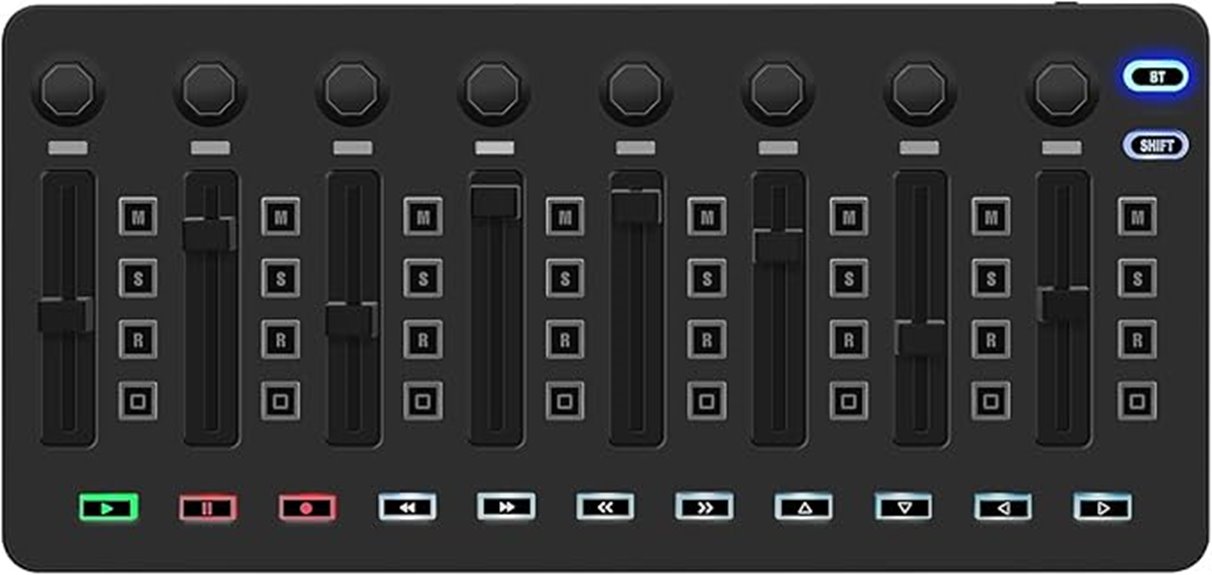
The M-VAVE Wireless MIDI Controller Mixer is an excellent choice for musicians and producers who need a portable, versatile device for on-the-go music creation. It offers Bluetooth connectivity with low latency, ensuring stable, untethered performance anywhere—studio, café, or hotel. The controller features a semi-weighted 25-key keyboard, 8 knobs, and 8 soft-backlit pads, all designed for quiet, comfortable use. It supports extensive customization, allowing users to assign MIDI commands, store presets, and control parameters via its iOS app. With up to 16 hours of battery life and broad software compatibility, it’s perfect for seamless, flexible music production in any environment.
Best For: musicians and producers seeking a portable, versatile MIDI controller with wireless connectivity and extensive customization options.
Pros:
- Wireless Bluetooth connection with low latency for untethered, real-time control
- Highly customizable controls, presets, and MIDI mapping through the iOS app
- Long battery life of up to 16 hours and compact, portable design
Cons:
- Initial setup may be confusing for some users unfamiliar with MIDI controllers
- Slightly higher price point compared to basic wired MIDI controllers
- Limited number of keys (25) may not suit users needing extensive keyboard range
Arteck Wireless & Bluetooth Touch TV Keyboard with Touchpad
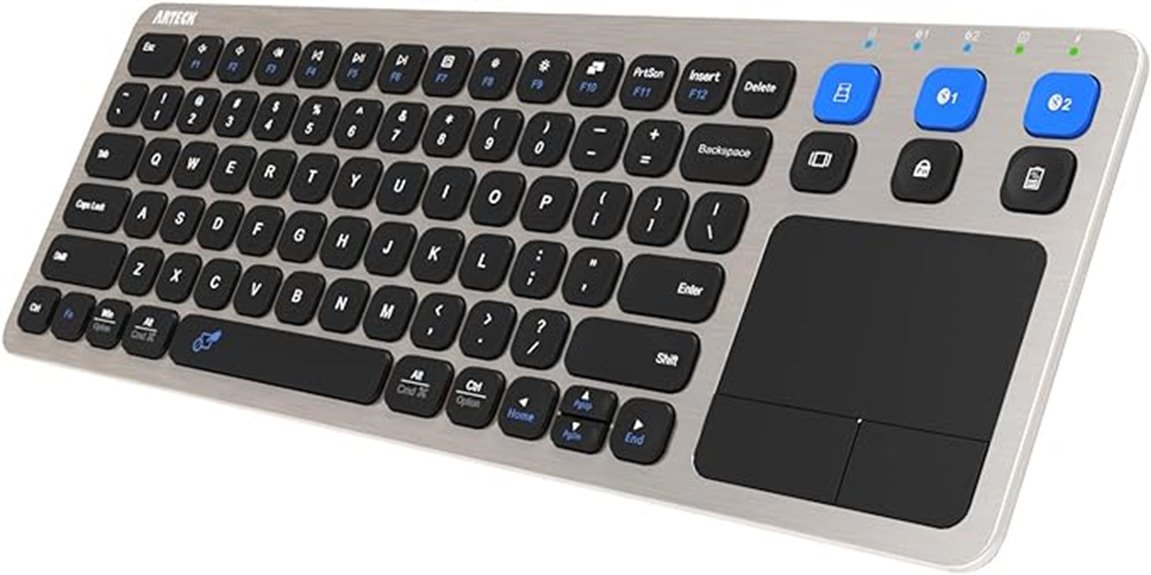
Designed for versatility, the Arteck Wireless & Bluetooth Touch TV Keyboard with Touchpad excels when you need a compact, multi-device controller for smart TVs, computers, or gaming consoles. It supports both 2.4G USB wireless and Bluetooth, allowing connection to three devices simultaneously and easy switching with a single click. Its range extends up to 10 meters, making it perfect for couch control or large rooms. The durable aluminum shell, whisper-quiet chiclet keys, and integrated touchpad provide a comfortable user experience. With media hotkeys and rechargeable battery, it’s ideal for media control, casual browsing, and smart device input, all in a sleek, portable design.
Best For: users seeking a versatile, compact, multi-device wireless keyboard with a touchpad for smart TVs, computers, and gaming consoles.
Pros:
- Supports multi-device connection and easy switching with a single click.
- Durable aluminum shell and quiet chiclet keys enhance comfort and longevity.
- Long-range wireless operation up to 10 meters allows flexible control from a distance.
Cons:
- Some users experience connection stability issues, especially with Bluetooth.
- Difficulties in re-establishing Bluetooth pairing can occur for certain devices.
- Limited support from the manufacturer may hinder troubleshooting and assistance.
M-VAVE 25 Key USB MIDI Keyboard Controller with 8 Backlit Drum Pads
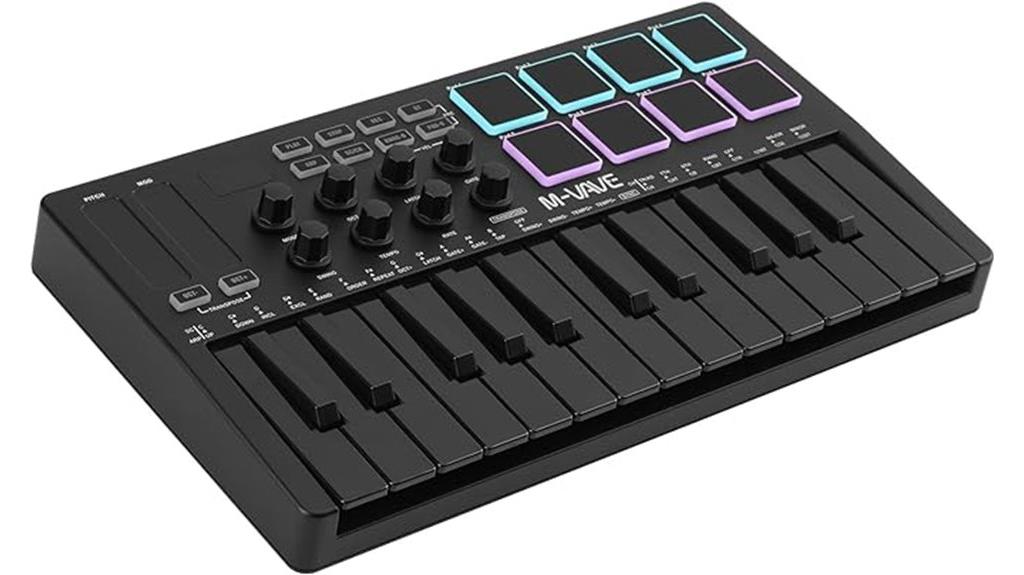
If you’re looking for a compact and portable MIDI controller that offers versatile music production features, the M-VAVE 25 Key USB MIDI Keyboard Controller is an excellent choice. It has 25 velocity-sensitive mini keys, 8 RGB backlit drum pads, and 8 assignable rotary encoders, plus 2 touch stripes for pitch bending. Its semi-weighted keybed feels professional yet versatile for studio or live use. Compatible with Windows, Mac, Android, iOS, and supporting wireless Bluetooth, it’s perfect for mobile setups. The built-in 2,000 mAh battery provides around 16 hours of use, making it ideal for on-the-go music creation.
Best For: musicians, producers, and songwriters seeking a compact, portable MIDI controller with versatile features suitable for studio, live, or mobile music production.
Pros:
- Compact and lightweight design for portability and on-the-go use
- Seamless compatibility with multiple platforms and popular DAWs
- Long-lasting built-in battery offers up to 16 hours of continuous operation
Cons:
- Limited keys (25) may restrict more complex performances or arrangements
- Lacks extensive fader controls found on larger MIDI controllers
- May require additional software or hardware for advanced sound design and mixing
Akai MPK Mini MK3 USB MIDI Keyboard Controller
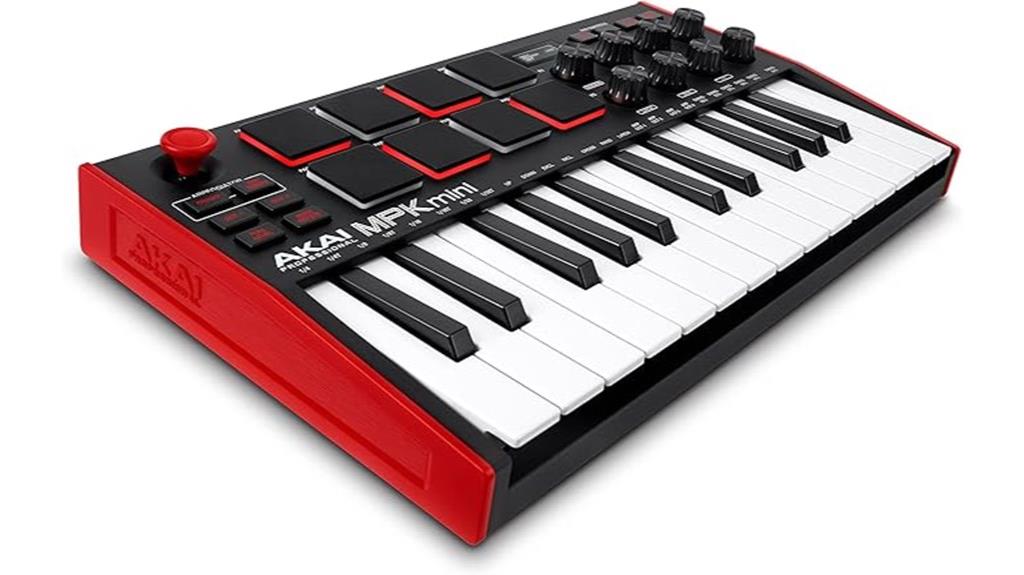
For musicians who need portability without sacrificing control, the Akai MPK Mini MK3 USB MIDI Keyboard Controller offers an ideal solution. Its compact 25-key design, weighing just 2 pounds, makes it perfect for traveling or small studios. The velocity-sensitive mini keys respond smoothly, while the 8 backlit MPC-style drum pads and 8 assignable knobs provide versatile control. The 4-way thumbstick adds expressive pitch and modulation tweaking, and the small OLED screen offers real-time feedback. Compatible with Windows and Mac, it’s a plug-and-play device that seamlessly integrates with any DAW. Its durability and feature-rich design make it a top choice for on-the-go music production.
Best For: musicians, producers, and beginners seeking a portable, versatile MIDI controller for studio and on-the-go music creation.
Pros:
- Compact and lightweight design ideal for travel and small spaces
- Responsive velocity-sensitive keys and versatile control options including pads, knobs, and thumbstick
- Seamless plug-and-play compatibility with major DAWs across Windows and Mac
Cons:
- Limited to 25 keys, which may not suffice for complex performances or compositions
- Limited track capacity in the bundled MPC Beats software (8 MIDI, 2 audio) without upgrade
- Plastic build, which may feel less durable compared to metal-rack controllers
Donner Mini MIDI Keyboard (N-25)
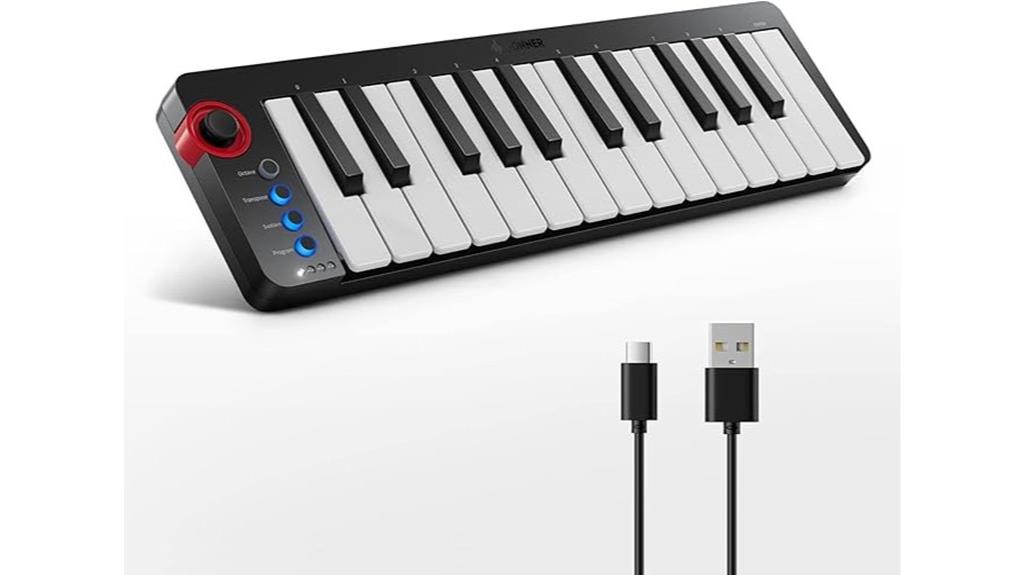
Looking for a portable MIDI controller that’s perfect for beginners or musicians on the go? The Donner Mini MIDI Keyboard (N-25) is a compact, lightweight option with 25 velocity-sensitive keys that let you craft expressive melodies easily. Its small size makes it perfect for travel and tight setups, and the light-up buttons give helpful visual feedback. It connects effortlessly to Mac, iOS, PC, iPhone, or iPad via USB-MIDI without extra drivers. Designed with simplicity in mind, it features a user-friendly layout, a pitch-bend wheel, and four programmable banks. Plus, it comes with educational resources to jumpstart your music creation journey.
Best For: beginners, students, and musicians on the go seeking a portable, easy-to-use MIDI controller for music creation and learning.
Pros:
- Compact and lightweight design for portability and travel.
- Velocity-sensitive keys and light-up buttons enhance expressive playing and visual feedback.
- Plug-and-play connectivity with multiple devices and DAWs without needing extra drivers.
Cons:
- Limited to 25 keys, which may not suit complex compositions or advanced players.
- Basic features might require additional software or controllers for professional studio use.
- No built-in display or advanced controls, potentially limiting real-time editing options.
RockJam Go 25 Key USB and Bluetooth MIDI Keyboard Controller
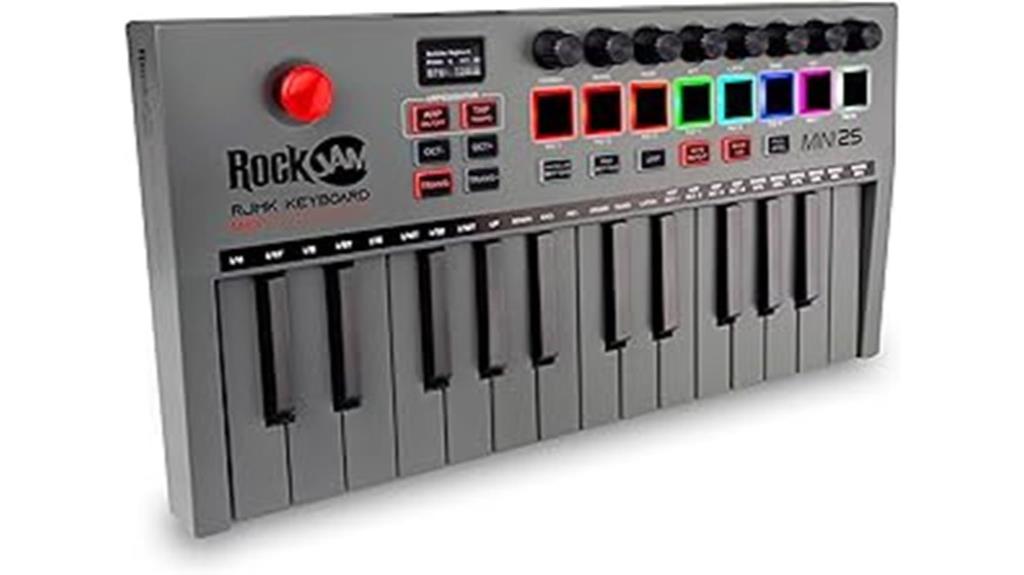
The RockJam Go 25 Key USB and Bluetooth MIDI Keyboard Controller stands out as an ideal choice for musicians on the move who need a portable, versatile instrument. Its lightweight design, weighing just 1.75 pounds, makes it easy to carry anywhere. The 25 mini keys are perfect for beginners and casual players, supporting both USB and Bluetooth connections to laptops, tablets, and smartphones. It includes features like backlit drum pads, control knobs, an omni-directional joystick, and built-in rhythms, making it a thorough tool for practice and music creation. Despite its plastic build and limited key sensitivity, it offers great value for portable, beginner-friendly music production.
Best For: beginners, hobbyists, and musicians seeking a portable, easy-to-use MIDI controller for practice and casual music production.
Pros:
- Lightweight and highly portable design for on-the-go use
- Wireless connectivity options including Bluetooth and USB compatibility
- User-friendly features like built-in rhythms, demo songs, and multiple instrument voices
Cons:
- Non-touch-sensitive keys limit expressive playing dynamics
- Plastic build may affect durability over time
- Limited 25-key range may restrict complex or advanced compositions
AKAI Professional LPK25 USB MIDI Keyboard Controller with 25 Keys

The AKAI Professional LPK25 USB MIDI Keyboard Controller stands out as the ideal choice for musicians and producers who need a compact, portable solution without sacrificing essential features. Weighing less than a pound and measuring under 13 inches, it easily fits into bags or laptop cases. Its responsive synth-action keys deliver expressive play, supported by octave controls, a sustain button, and a built-in arpeggiator. It’s universally compatible with Mac and PC, working seamlessly with popular DAWs through simple plug-and-play setup. With 8 programmable presets and included software, it offers versatile functionality perfect for songwriting, beat-making, or live performances on the go.
Best For: musicians, producers, DJs, and music creators seeking a portable, easy-to-use MIDI controller for songwriting, beat-making, and live performance.
Pros:
- Compact and lightweight design for portability and easy transportation
- Responsive synth-action keys that mimic real piano feel
- Seamless plug-and-play compatibility with Mac and PC DAWs
Cons:
- USB socket may feel loose or less sturdy over time
- Limited to 25 keys, which may restrict extensive keyboard playing or complex arrangements
- Lacks advanced controls such as knobs or faders found on higher-end controllers
Arturia MiniLab 3 MIDI Controller for Music Production
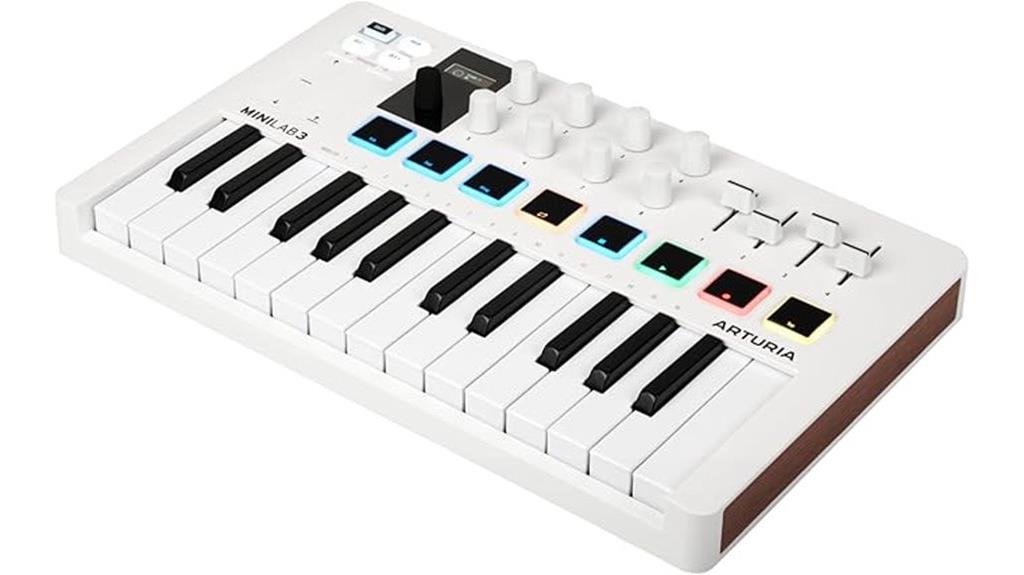
For musicians seeking a portable, versatile MIDI controller that seamlessly integrates with major DAWs, the Arturia MiniLab 3 stands out as an excellent choice. Its sleek, lightweight design weighs just 2.2 pounds, making it perfect for mobile use without sacrificing durability. The 25-responsive keys, RGB pads, rotary encoders, and sliders provide extensive control, while the mini display and browsing knob simplify navigation. Compatible with Mac and Windows, it works well with Ableton Live, Logic Pro, and others. Plus, its bundled software, including Analog Lab V and Ableton Live Lite, offers a rich creative platform. Overall, it combines portability, style, and professional features effortlessly.
Best For: musicians and producers seeking a portable, versatile MIDI controller that integrates seamlessly with major DAWs for both live performances and studio work.
Pros:
- Compact, lightweight design weighing only 2.2 pounds for easy portability
- Extensive control options including 25 velocity-sensitive keys, RGB pads, encoders, and sliders
- Compatible with Mac and Windows, supporting major DAWs like Ableton Live, Logic Pro, and more
Cons:
- Controls have minimal labeling, which may require memorization for some users
- Pads, while responsive, might be less sturdy compared to competitors like Akai
- Software registration and account setup are necessary to access the full bundle features
LEKATO Wireless MIDI Adapter for Mac, iOS, Windows
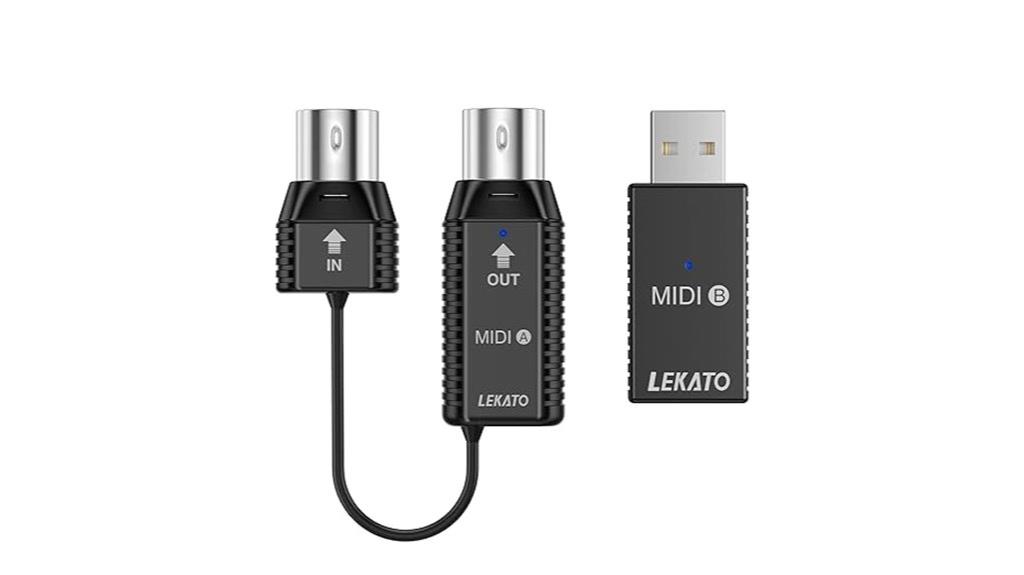
If you’re looking to streamline your MIDI setup without sacrificing responsiveness, the LEKATO Wireless MIDI Adapter is an excellent choice. It offers ultra-low latency (just 3ms), ensuring your playing feels immediate and natural. This adapter replaces messy cables, giving you a tidy workspace and the freedom to control sound modules or controllers from different locations, whether on stage or in the studio. Compatible with Mac, iOS devices, and Windows PCs, it connects effortlessly via Bluetooth using a USB dongle. With no driver installation needed, setup is quick, and the stable transmission makes wireless feel just as responsive as wired.
Best For: musicians, producers, and sound engineers who need a responsive, cable-free MIDI setup for live performances or studio work across Mac, iOS, and Windows devices.
Pros:
- Ultra-low latency (3ms) for immediate, natural playing experience
- Easy plug-and-play setup with no driver installation required
- Compatible with a wide range of MIDI hardware and devices, including Mac, iOS, and Windows
Cons:
- Requires Bluetooth MIDI apps or software for wireless connection, not direct phone Bluetooth pairing
- Power for MIDI Ⓐ depends on the built-in rechargeable battery, which needs periodic charging
- May have limited range depending on environment interference, typical for Bluetooth devices
TECKNET 2.4G Wireless Mini Keyboard with Media Hotkeys
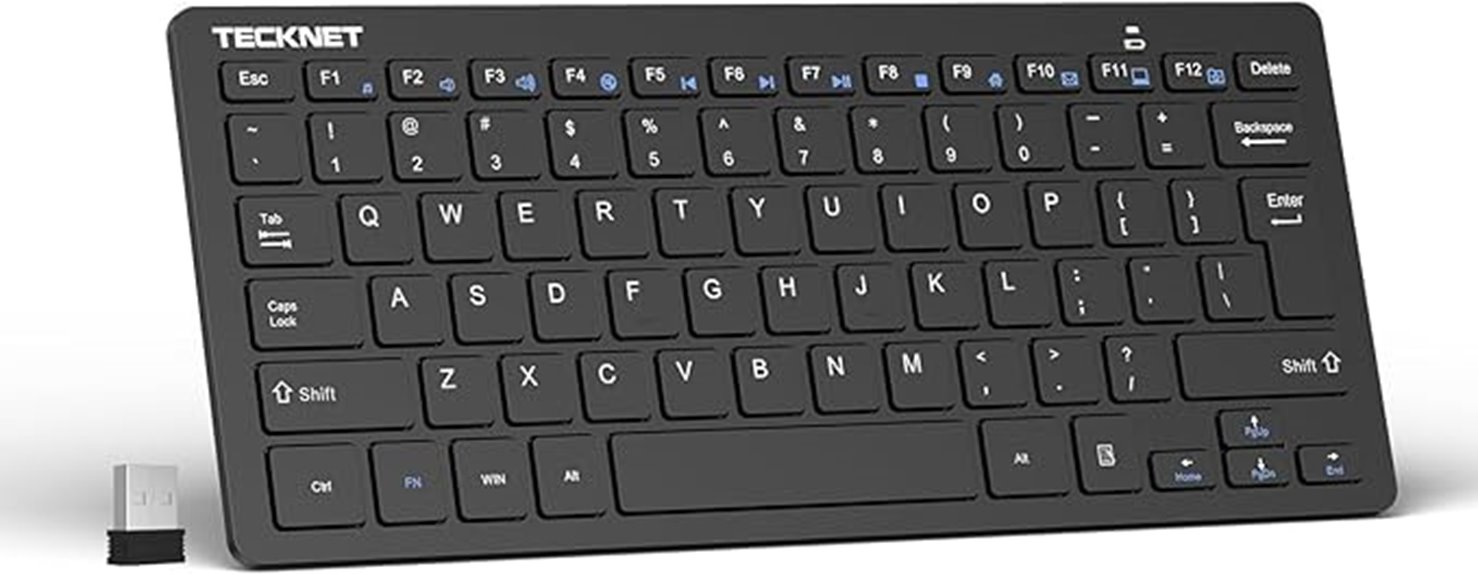
Ideal for users who value portability and quick access to media controls, the TECKNET 2.4G Wireless Mini Keyboard with Media Hotkeys combines compact design with convenient shortcut keys. Its slim, lightweight build measures just 11.5 x 4.9 inches and weighs only 10.4 ounces, making it perfect for travel, home, or office use. The stylish chocolate keycaps and small footprint ensure easy transport and space-saving setup across devices like PCs, laptops, and smart TVs. With a stable wireless connection up to 49 feet, quiet keys, and dedicated media hotkeys, it delivers a reliable, user-friendly experience. Plus, its long battery life and spill resistance make it a practical choice for everyday use.
Best For: users seeking a portable, space-saving wireless keyboard with quick media access for casual use at home, office, or on the go.
Pros:
- Compact and lightweight design for easy portability and space-saving setup
- Stable wireless connection up to 49 feet with quiet, comfortable keys
- Long battery life with power-saving features and spill resistance
Cons:
- Some users find the build feels cheap or may experience layout quirks (e.g., swapped @ and # keys)
- Not suitable for extensive typing, gaming, or professional use requiring high durability
- Batteries (2 AAA) are not included, requiring additional purchase
Wireless Keyboard and Mouse Combo with Round Keycaps for Mac/Windows/PC
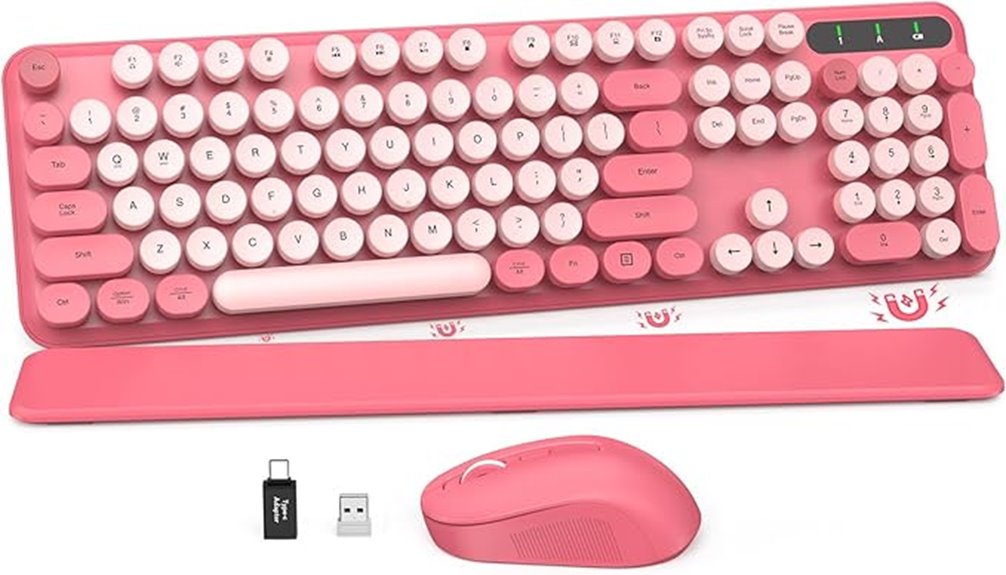
The Wireless Keyboard and Mouse Combo with Round Keycaps stands out as a stylish and functional choice for users who want to enhance their workspace with a retro-inspired aesthetic. Its colorful, typewriter-style keycaps give it a unique, vintage look, while the detachable magnetic wrist rest adds comfort and reduces fatigue. The combo features a splash-proof, easy-to-clean design with adjustable tilt legs and anti-slip pads for ergonomic use. The wireless connection is reliable via a USB receiver, though it’s incompatible with Mac and iOS. Overall, it’s a durable, portable set perfect for boosting productivity and adding personality to any Mac, Windows, or PC setup.
Best For: users seeking a stylish, retro-inspired wireless keyboard and mouse combo compatible with Windows and PC systems for work, study, or leisure.
Pros:
- Unique vintage design with colorful round keycaps for aesthetic appeal
- Detachable magnetic wrist rest provides extra comfort and reduces fatigue
- Reliable 2.4GHz wireless connection with easy setup and long battery life
Cons:
- Not compatible with Mac or iOS devices, limiting versatility for Apple users
- Occasional connectivity issues reported with the mouse in some reviews
- Requires batteries (not included), adding to ongoing maintenance
AULA S98 Pro Wireless Mechanical Keyboard with Screen & Knob
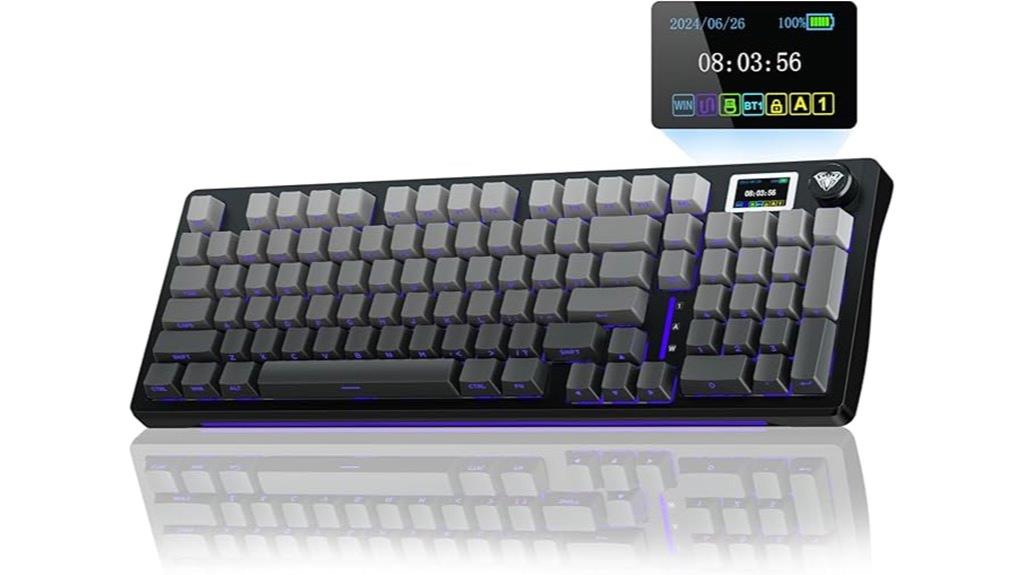
The AULA S98 Pro wireless mechanical keyboard stands out for musicians and content creators who want seamless control over their devices without the clutter of cables. Its sturdy, premium build feels solid and durable, thanks to heavy construction and high-quality PBT keycaps that resist fading and provide a soft touch. The large 4000mAh battery supports long sessions, while the mini screen and multi-function knob offer quick adjustments and customization, including GIF uploads. Supporting Bluetooth 5.0, 2.4GHz, and USB-C, it’s compatible with multiple devices and platforms. Pre-lubricated linear switches, RGB lighting, and adjustable effects make it both functional and visually appealing, perfect for versatile use.
Best For: content creators, gamers, and professionals seeking a versatile, premium wireless mechanical keyboard with customizable features and multi-device support.
Pros:
- Durable, high-quality build with heavy construction and premium PBT keycaps
- Multi-mode connectivity supporting Bluetooth 5.0, 2.4GHz, and USB-C for seamless device switching
- Customizable RGB lighting, mini screen for GIF display, and multi-function knob for quick adjustments
Cons:
- Software customization can be complex and may seem sketchy initially
- Some users report Bluetooth connectivity issues
- Slightly louder keystrokes compared to traditional quiet keyboards
Donner USB-C MIDI Keyboard Controller, 25-Key Portable Mini MIDI Keyboard

For musicians on the move, the Donner DMK 25 Pro USB-C MIDI Keyboard Controller offers a compact and versatile solution that fits easily into a backpack or laptop bag. Its 25 keys and built-in features like 8 drum pads, OLED display, smart scales, arpeggio, and a personalized touch bar make it ideal for creative play anywhere. Designed for PC, tablets, and smartphones, it connects via USB-C, supporting popular DAWs like Logic and Pro Tools. While some users find the sensitivity inconsistent and setup challenging, its portability, extensive functions, and affordability make it a solid choice for beginners and hobbyists seeking seamless music production on the go.
Best For: beginners, hobbyists, and musicians seeking a portable, feature-rich MIDI controller for on-the-go music production and practice.
Pros:
- Compact and lightweight design for easy portability and storage
- Extensive features including drum pads, smart scales, arpeggio, and teaching courses
- Compatible with major DAWs and mobile devices via USB-C connection
Cons:
- Inconsistent velocity sensitivity on keys and drum pads reported by some users
- Setup and software installation can be complex and challenging, especially on Windows
- Limited sound production capabilities; requires connection to external DAW or software to generate sound
Factors to Consider When Choosing a Wireless MIDI Keyboard

When selecting a wireless MIDI keyboard, I focus on key factors like connectivity options, latency, and platform compatibility to guarantee seamless performance. Portability and build quality also matter since I want a device that’s easy to carry and durable enough for regular use. Understanding these points helps me find a keyboard that fits my setup and playing style perfectly.
Connectivity Options
Choosing the right wireless connectivity for your MIDI keyboard is essential for seamless performance and ease of use. Bluetooth MIDI is popular because it offers low latency and reliable connections, making it ideal for both live gigs and studio work, with a range of up to 10 meters. Wi-Fi or specialized adapters can support higher data transfer rates and longer distances but might require extra setup or network configuration. Many wireless MIDI keyboards support multiple device pairing, so you can switch effortlessly between tablets, smartphones, and computers. Compatibility varies depending on the wireless protocol and your device’s operating system, whether Windows, macOS, iOS, or Android. Ensuring your keyboard matches your devices’ connectivity options is key to a smooth, cable-free music production experience.
Latency and Response
Latency and response time are critical factors that directly affect how smoothly your wireless MIDI keyboard performs during play. Low latency, ideally under 5 milliseconds, ensures real-time responsiveness, making your performance feel natural and expressive. When response time exceeds 10 milliseconds, delays become noticeable, creating a lag that can disrupt your playing and flow. Bluetooth MIDI connections often have higher latency compared to dedicated wireless adapters or wired setups, which can impact responsiveness during live performances or recording. However, advanced protocols like Bluetooth 5.0 or proprietary low-latency solutions can deliver response times comparable to wired devices. Consistent response and minimal latency are essential for maintaining timing precision, especially during improvisation, studio work, or live shows.
Compatibility Platform
Ensuring your wireless MIDI keyboard supports your operating system is essential for a smooth setup and reliable performance. Whether you use Windows, macOS, iOS, Android, or Linux, compatibility matters. Check that the device’s connectivity options—Bluetooth, Wi-Fi, or proprietary protocols—match your hardware and software requirements. It’s also important to verify that the keyboard’s software and firmware work seamlessly with your digital audio workstation (DAW) or music app. Some keyboards require drivers, while others are driver-free; knowing what’s supported prevents setup headaches. Additionally, look for cross-platform compatibility features, such as multi-device pairing or support across multiple operating systems, to enhance versatility. Being thorough here ensures your wireless MIDI keyboard integrates effortlessly into your production environment.
Portability and Size
When selecting a wireless MIDI keyboard, portability and size are key factors that can substantially impact your setup and performance flexibility. It’s important to contemplate the overall weight and dimensions, especially if you frequently travel or perform on the go. Smaller models with 25 or 32 keys are highly portable but offer a limited range of notes compared to full-size keyboards. A slim profile—less than an inch thick—makes packing easier and reduces bulk. Additionally, a built-in rechargeable battery enhances portability by removing the need for external power sources. For those prioritizing mobility, compact controllers weighing under 2 pounds are ideal, providing lightweight convenience without sacrificing essential features. Choosing the right size ensures your setup remains manageable and ready for any performance or practice session.
Build Durability
A wireless MIDI keyboard’s durability is essential for reliable performance, especially if you frequently transport it or use it in various environments. A well-built keyboard features rugged construction with high-quality materials like metal or reinforced plastic to withstand regular handling. Reinforced joints and sealed controls help protect against shocks, drops, dust, and moisture, extending its lifespan. The quality of internal components, such as circuit boards and connectors, also plays a pivotal role in durability, ensuring consistent operation over time. Additionally, reinforced edges and non-slip pads add protection from accidental impacts and improve stability during play. To gauge long-term reliability, I recommend checking user reviews for real-world insights on how well the keyboard holds up under daily use.
Software Integration
How well a wireless MIDI keyboard integrates with your digital audio workstation (DAW) can make or break your workflow. It’s vital to ensure compatibility with your preferred DAW and virtual instruments, so everything syncs smoothly. Check if the manufacturer offers dedicated software or control apps that enable custom mapping, preset management, and control surface setup—these features boost your creative flexibility. Additionally, verify that the keyboard supports standard MIDI protocols and connects reliably via Bluetooth, Wi-Fi, or USB. Software updates and support channels are essential for maintaining compatibility with evolving DAW platforms and OS versions. Features like MIDI learn, parameter mapping, and automation control should also be available, allowing you to tailor your setup for maximum efficiency and creative control.
Battery Life
Choosing a wireless MIDI keyboard isn’t just about compatibility and features; battery life plays a key role in your overall experience. A longer battery life means you can play for extended sessions without constantly recharging, which is essential for portability and convenience. Battery capacity, measured in mAh, directly impacts how many hours it can operate on a single charge. Devices with quick-charging options or low power consumption help reduce downtime, keeping you ready to create. The type of batteries also matters—rechargeable lithium-ion batteries tend to last longer and are more eco-friendly than disposable alkaline ones. Additionally, features like power-saving modes or auto-sleep functions can considerably extend battery life during periods of inactivity, ensuring your keyboard stays ready whenever inspiration strikes.
Frequently Asked Questions
How Does Latency Impact Wireless MIDI Performance?
Latency really affects how smoothly I can produce music wirelessly. When latency is low, my keyboard’s responses feel immediate, making playing and recording more natural. But if latency is high, I notice delays, which can throw off my timing and creativity. That’s why I prioritize wireless MIDI gear with minimal latency; it helps me stay in the flow without disruptive pauses or lag.
Are Wireless MIDI Keyboards Compatible With All DAWS?
Wireless MIDI keyboards generally work with most DAWs like Ableton Live, Logic Pro, and FL Studio, but compatibility can vary. I always check the specific device’s specs and software support before buying. Some DAWs might need additional drivers or setup steps. To guarantee smooth integration, I recommend verifying compatibility on the manufacturer’s website or user forums. This way, I avoid surprises and get right to making music.
What Is the Battery Life of Wireless MIDI Keyboards?
Battery life becomes a big concern when I’m jamming away. Most wireless MIDI keyboards offer impressive endurance, typically lasting around 8 to 20 hours on a single charge. Some models even boast quick charging features, so I can quickly power up and get back to creating. It really depends on the device, but I always look for a keyboard that can keep up with my musical marathon.
Can Wireless MIDI Keyboards Connect to Multiple Devices Simultaneously?
Yes, many wireless MIDI keyboards can connect to multiple devices at once, especially those with Bluetooth 5.0 or newer. I’ve used models that easily switch between my laptop, tablet, and smartphone without reconnecting. Just keep in mind, some keyboards may have limitations or require specific pairing modes. It’s important to check the device specifications to confirm multi-device connectivity, so you can switch seamlessly during your music sessions.
How Secure Are Wireless MIDI Connections Against Interference?
Wireless MIDI connections are generally quite secure, but they can be vulnerable to interference from other wireless devices. I recommend using keyboards that support strong encryption protocols like WPA2 or WPA3, and operating on less crowded frequencies like 5GHz. Keeping firmware updated also helps protect against potential vulnerabilities. Overall, with proper precautions, wireless MIDI can be both reliable and secure for seamless music production.
Conclusion
Choosing the right wireless MIDI keyboard can truly elevate your music production. Imagine a producer like Sarah, who switched to the Xkey 25 Air and now creates tracks seamlessly on the go. Whether you’re gigging or studio-bound, the best fit depends on your style and needs. So, consider your workflow carefully—because the perfect wireless MIDI keyboard isn’t just a tool, it’s your new creative partner.

